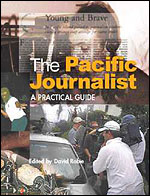|
|
|
Pacific Journalist Guide SUVA: A new journalism book targeted specifically at the Pacific region offers aspiring and professional journalists the first comprehensive guide to regional media law, ethics and case studies. The Pacific Journalist: A Practical Guide, edited by USP journalism coordinator David Robie, includes contributions from a broad range of well-known Pacific region journalists and educators, including former Fiji Daily Post editor Jale Moala; Agence France-Presse correspondent in Suva, Asha Lakhan; Australian Broadasting Corporation correspondent Richard Dinnen in Papua New Guinea; and television journalist and lawyer Ingrid Leary. The 372-page book will be launched by Vice-Chancellor Savenaca Siwatibau with Daily Post publisher Ranjit Singh at USP's Oceania Centre tomorrow. Two other Pacific titles by local authors - Eating Mangoes by Mohit Prasad and The Word, the Pen and the Pistol by Robert Nicole - are also being launched. Mr Robie said while there were many good journalism books in the Pacific, there was a lack of books with a Pacific content and local case studies - especially in the current period of fast technological change and moves towards media convergence. "This book provides much of the core information in areas such as media law and ethics with Pacific case studies and basic news writing skills that didn't really exist before," \Mr Robie said. "This means that students and journalists will be better prepared with meaningful local examples." The book includes Pacific region case studies, allowing journalists to apply relevant principles and techniques. "For example, there is a chapter about trauma reporting in the region - and how to cope with it. Many young journalists found crises like the Aitape tidal wave disaster in Papua New Guinea, the Air Fiji crash, the Solomon Islands upheaval and the Speight coup hard to handle. "This is the first media book in the region to address such dilemmas," Mr Robie said. Other subjects addressed in the book include online journalism and the presence of foreign correspondents in the region. According to Mr Robie, the book has been "on the boil" for about two years, but was put on hold as a result of the Fiji coup on May 19, 2000. The idea for the book, he said, arose from not being able to provide USP's journalism students with regionally relevant teaching material and texts. "I decided to recruit a team of contributors and produce a book which would meet this need," Mr Robie said. |

